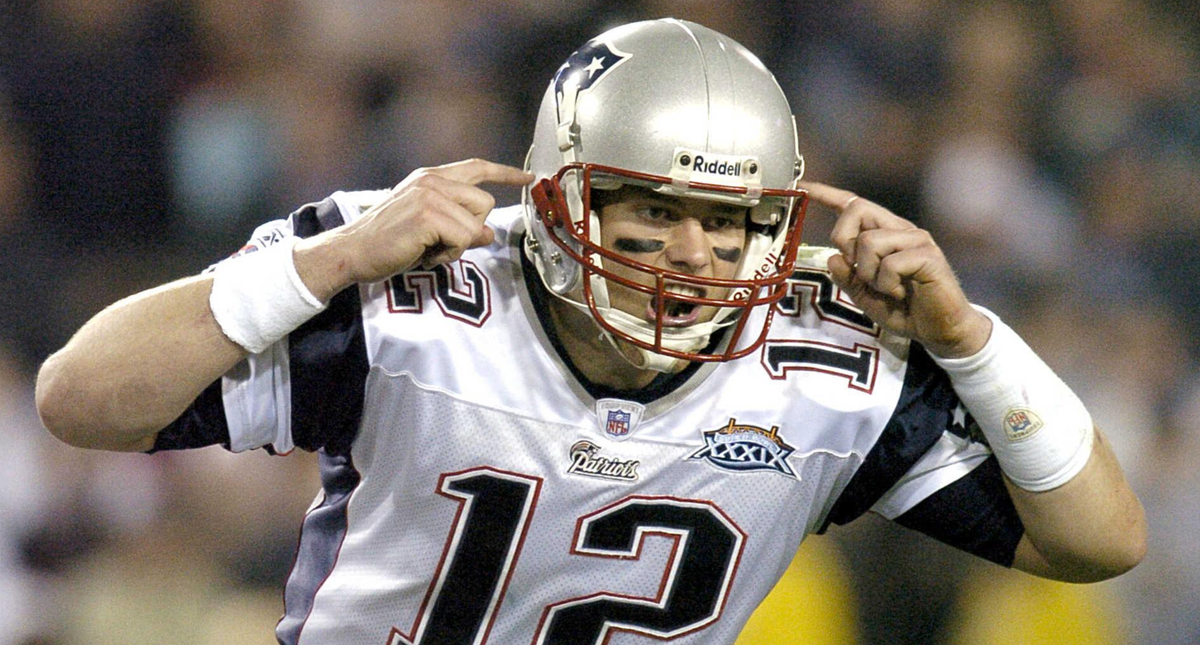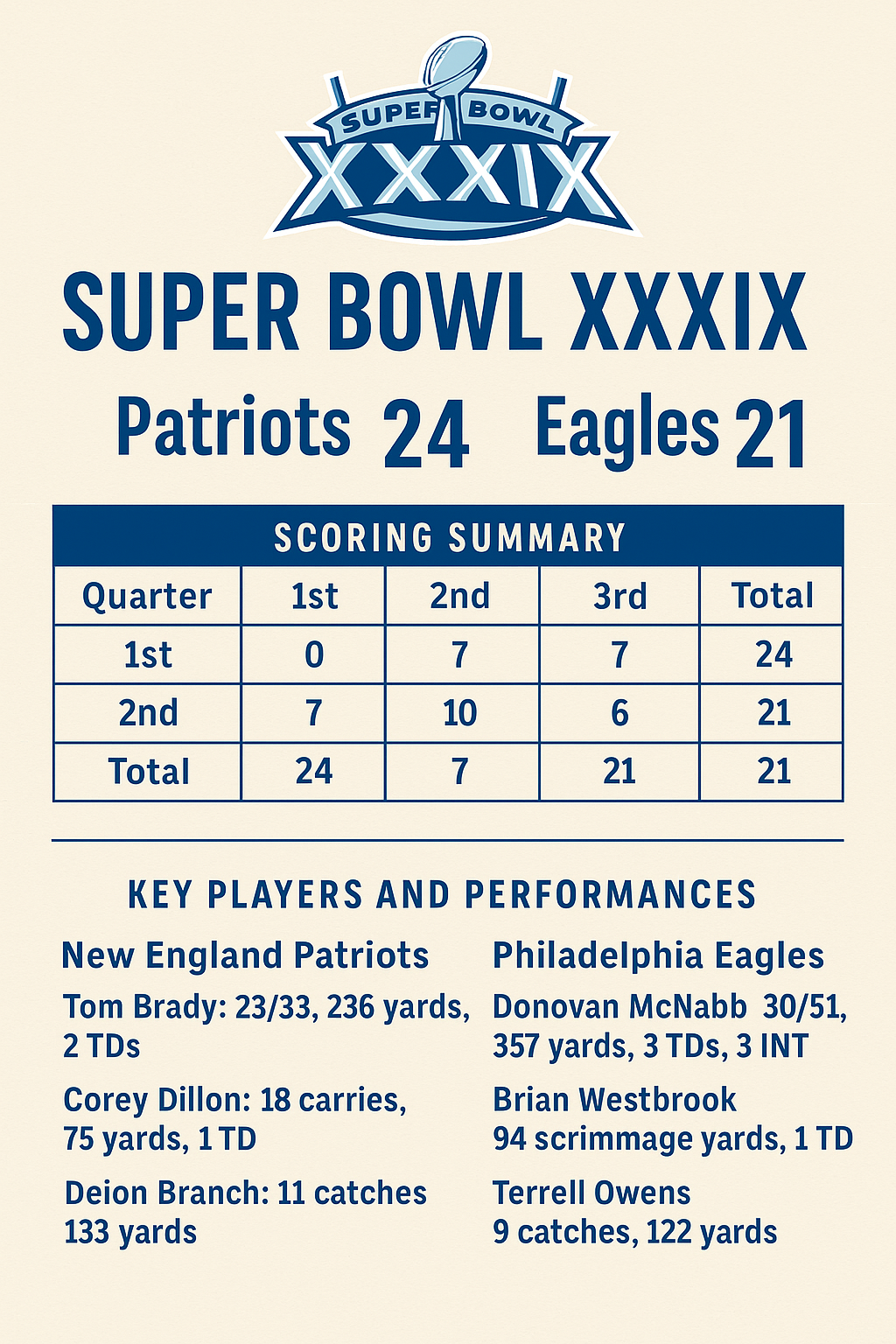Super Bowl XXXIX: Patriots Edge Eagles to Cement Dynasty Status

On February 6, 2005, the world of football witnessed the final chapter of what would become one of the NFL’s greatest dynasties. Super Bowl XXXIX, played at Alltel Stadium in Jacksonville, Florida, pitted the New England Patriots against the Philadelphia Eagles in a battle of elite defenses, poised quarterbacks, and two of the league’s most innovative head coaches. When the dust settled, the Patriots secured their third Super Bowl title in four years, defeating the Eagles 24–21, and confirming their place in football lore.
A Clash of Eras and Philosophies
The New England Patriots, led by head coach Bill Belichick and quarterback Tom Brady, came into the game as defending champions and had already lifted the Lombardi Trophy in Super Bowls XXXVI and XXXVIII. Their philosophy was simple: discipline, adaptability, and execution. Belichick’s defense, known for its cerebral adjustments and tight coverages, paired with Brady’s efficiency, had created a machine that rarely made mistakes.
On the other sideline were the Philadelphia Eagles, coached by Andy Reid and quarterbacked by Donovan McNabb. Philadelphia had finally overcome its NFC Championship hurdle after three straight failed attempts. The addition of elite wide receiver Terrell Owens, who returned from a serious ankle injury just in time for the Super Bowl, added a jolt to the Eagles' passing attack and gave McNabb a dynamic target.
The matchup was widely seen as a referendum on dynasties versus upstarts, precision versus flash, and game management versus high-risk playmaking.
The Game: Strategy, Execution, and a Nail-Biting Finish
The first half of the game was a defensive chess match. Both teams struggled to find a rhythm, and turnovers loomed large. The Eagles struck first with a six-yard touchdown pass from McNabb to L.J. Smith, but the Patriots responded with a drive capped by a David Givens touchdown reception.
By halftime, the game was tied at 7–7, and fans knew they were witnessing a classic.
In the second half, the Patriots took control. Brady, known for his icy composure, delivered two key touchdown passes—one to linebacker Mike Vrabel, who was lining up as a tight end, and another to Corey Dillon, who also rushed for over 75 yards on the day. The Patriots' offense didn't post gaudy numbers, but it was balanced and methodical.
The Eagles, however, would not go quietly. McNabb engineered a fourth-quarter touchdown drive, connecting with Greg Lewis in the end zone to bring the game within three points. But Philadelphia’s clock management became a subject of intense scrutiny. The Eagles took nearly five minutes to run their final touchdown drive, leaving them little time for a final comeback.
In the waning seconds, a last-ditch effort to move into field goal range fell short, and the Patriots sealed the victory.
MVP Performance: Deion Branch
Deion Branch was named Super Bowl MVP after hauling in 11 catches for 133 yards. He consistently found soft spots in the Eagles’ zone defense and served as Brady’s go-to weapon in critical moments.
“Branch wasn’t just productive—he was surgical,” noted the Super Bowl Historical Society in their 2005 retrospective. “His route running and spatial awareness made him the quiet assassin of the Patriots’ passing game.”
Terrell Owens’ Gritty Return
Despite the loss, Terrell Owens turned in a performance that will be remembered for its sheer determination. Coming back from a broken fibula and ligament damage in his ankle just seven weeks prior, Owens defied medical expectations and caught 9 passes for 122 yards. His impact was undeniable, and many felt he deserved MVP consideration even in defeat.
“Owens played with the heart of a lion,” wrote the Super Bowl Historical Society in a 2015 retrospective. “What he did on one good leg—on that stage—remains one of the gutsiest performances in Super Bowl history.”
Coaching Battle: Belichick vs. Reid
The coaching duel was just as fascinating as the on-field action. Belichick’s defensive adjustments, especially late in the second quarter and during critical red zone stands, neutralized McNabb’s scrambling ability and forced several errant throws. Tedy Bruschi, Willie McGinest, and Rodney Harrison all made pivotal plays, including two fourth-quarter interceptions.
Reid, meanwhile, came under fire postgame for his questionable clock management. Analysts were stunned by how slowly the Eagles moved during their final scoring drive, and some speculated that fatigue or miscommunication contributed.
A Tale of Turnovers
Ultimately, turnovers were the deciding factor. The Eagles committed four turnovers, including three interceptions thrown by McNabb and a critical fumble by running back Brian Westbrook. New England, by contrast, played clean football, which had become their calling card under Belichick.
The Patriots’ +3 turnover differential was the second-best in Super Bowl history at that time.
Legacy Cemented
With this win, the Patriots became the first team since the 1992–1995 Dallas Cowboys to win three Super Bowls in four seasons. Their dynasty was undeniable, with a young quarterback and a coach who had mastered the art of situational football.
Brady ended the night with 236 passing yards and two touchdowns, improving his Super Bowl record to 3–0. The win established Brady and Belichick as the gold standard of the modern NFL.
Philadelphia’s Window
For the Eagles, the loss was heartbreaking. It was their first Super Bowl appearance since 1980, and it would take them over a decade to return to the big stage. McNabb’s performance—albeit with three touchdowns—was marred by three costly interceptions and reports that he was fatigued during the final drive.
Yet the effort, particularly by Owens, was heroic. The Eagles proved they belonged on the national stage, but they left Jacksonville with more questions than answers.
Cultural Impact
Super Bowl XXXIX wasn’t just a football game—it was a cultural moment. The halftime show, headlined by Paul McCartney, was a return to form for the NFL after the controversial Janet Jackson performance the year prior. McCartney’s rendition of “Hey Jude” united the crowd and was a safe, nostalgic choice that signaled a reset.
The broadcast, aired on FOX, drew over 86 million viewers, and advertisers paid a record $2.4 million for 30-second commercial slots. The game also marked the first Super Bowl held in Jacksonville, and despite criticism over limited hotel capacity, the city delivered a memorable fan experience.
Final Score
New England Patriots 24, Philadelphia Eagles 21
Scoring Summary:
- 1st Quarter:
- PHI – L.J. Smith 6-yard pass from McNabb (7–0)
- NE – David Givens 4-yard pass from Brady (7–7)
- 2nd Quarter:
- NE – Corey Dillon 2-yard run (14–7)
- 3rd Quarter:
- PHI – Brian Westbrook 10-yard pass from McNabb (14–14)
- 4th Quarter:
- NE – Mike Vrabel 2-yard pass from Brady (21–14)
- NE – Adam Vinatieri 22-yard FG (24–14)
- PHI – Greg Lewis 30-yard pass from McNabb (24–21)

Conclusion: The Birth of a Dynasty
Super Bowl XXXIX confirmed what many already suspected: the New England Patriots were no flash in the pan. They were a dynasty built on precision, selflessness, and a relentless attention to detail. With Brady ascending and Belichick scheming, the NFL had entered a new era.
For the Eagles, it was a night of valiant effort but fatal mistakes. Still, they walked off the field knowing they had the pieces to compete—and a performance by Owens that would live forever in Super Bowl lore.
The legacy of Super Bowl XXXIX endures because it wasn’t just about one game. It was about how dynasties are built—not with flair, but with discipline, resolve, and execution when it matters most.
